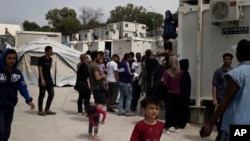Some 2,000 asylum-seekers will be moved out of a severely overcrowded migrant camp on the Greek island of Lesbos this month, a Greek official said Tuesday as charities slammed conditions at the camp, which has raw sewage running out of its main entrance.
Government spokesman Dimitris Tzanakopoulos said those being moved out of the Moria camp, which houses 9,000 people in a facility built for 3,100, will be sent to the mainland so their asylum claims can be examined.
"The situation in Moria is indeed difficult, it is indeed at the limit," Tzanakopoulos said.
Regional governor Christina Kalogirou had threatened to shut down the facility unless the Greek government improves conditions at Moria.
Camp resident Ali Sajjad Faizy, a 19-year-old from Afghanistan, said conditions at Moria have steadily worsened and anyone who wants food has to stand in line for many hours.
"It's completely full," he said.
Doctors Without Borders has called for the emergency evacuation of vulnerable people at the camp to the mainland and other European Union countries, citing an increase in suicide attempts and self-harm among children in Moria and cases of sexual attack.
"This is the third year that (we) have been calling on the Greek authorities and the EU to take responsibility for their collective failures and to put in place sustainable solutions to avoid this catastrophic situation," said Louise Roland-Gosselin of Doctors without Borders. "It is time to immediately evacuate the most vulnerable to safe accommodation in other European countries and to stop this never-ending cycle of emergency decongestions and the horrendous conditions we continue to witness in Moria."
Thousands of people fleeing violence and poverty at home are still arriving at Greek islands from the nearby Turkish coast. Between Friday and Sunday, more than 600 reached Lesbos alone.
Under a 2016 deal between the EU and Turkey designed to halt the flow of refugees and migrants into Europe, those arriving on Greek islands are held in detention camps there and face deportation back to Turkey unless their asylum applications are approved.
But the massive backlog of applications has led to severe overcrowding on the Greek island camps, even as authorities move hundreds of vulnerable people to the mainland.
"What the Greek government is trying to do is to reduce the time required for a decision to be issued granting — or rejecting — asylum ... but there is always reality," Tzanakopoulos said.
Tzanakopoulos said anti-immigration policies being pursued by Hungary, Poland and several other EU members had limited Greece's options to deal with the overcrowding problem.
"We must all understand that the only way for an overall solution to the immigration crisis is [to achieve] an equal and proportional sharing of refugees throughout Europe," he said.
Further to the east, Cyprus has been seeing an increase in the number of people arriving there to claim asylum. The EU's migration commissioner, Dimitris Avramopoulos, said Tuesday that the EU's new, upgraded border police could be dispatched to Cyprus.
An EU team will arrive in Cyprus shortly to determine what kind of help the country needs.
"Cyprus is not alone. Europe is at its side," Avramopoulos said after meeting with Cyprus' interior, foreign and justice ministers. "Cyprus is on Europe's borders and on the front line of the migrant and refugee crisis."
Avramopoulos said the EU's new border police will be "more advanced and upgraded" from the current body, Frontex, and will have an estimated 10,000 staff within a few years.
Interior Minister Constantinos Petrides said it's "impossible" for Cyprus, a divided island nation with just over 1 million people, to absorb large numbers of migrants.




